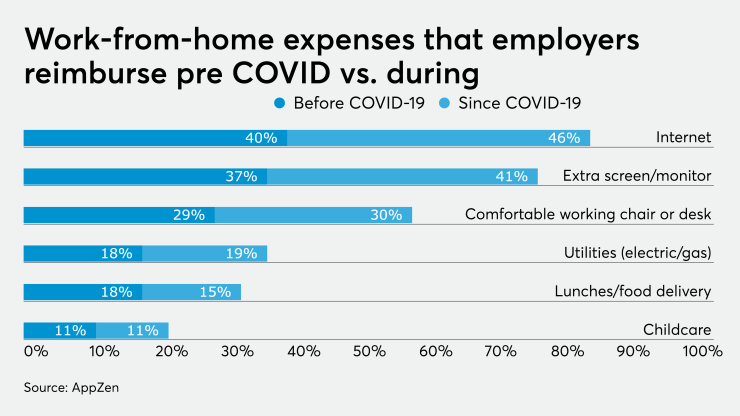The percentage of workers asking for compensation for work-from-home expenses with their employers hasn’t gone up significantly since the outbreak of the COVID-19 pandemic, according to a new survey, and women don’t feel they are being reimbursed fairly for their expenses as much as men.
The
Besides differences between the perceptions of women and men with regard to reimbursement, the survey also found some lingering cultural differences at organizations. The C-suite and company executives are more likely to have company credit cards and expense accounts, while the majority of employees first have to pay for work-related expenses with their own money before they are reimbursed. While 49 percent of owners and partners used corporate credit cards and expense accounts, as well as 48 percent of C-level executives, only 32 percent of lower-paid staff had corporate credit cards and expense accounts.
Nevertheless, the volume of work-from-home expenses has been growing because of COVID-19. Claims for internet usage at home have risen 6 percent, and 46 percent of companies are reimbursing for internet charges during the pandemic.

On the other hand, there has been no increase in childcare claims as expenses, even though many schools have been closed and parents have been forced to do a form of home-schooling as their children study remotely with their local schools. Only 19 percent of the survey respondents said their employer fully considered childcare costs in reimbursing employee expenses. While 29 percent of the employees polled by AppZen feel they are fairly compensated for new types of work-from-home expenses such as childcare, 26 percent of the respondents said they feel uncomfortable about claiming work-from-home expenses.
“Right now it can be anything from snacks to a desk — it's all over the place,” said AppZen CEO Anant Kale. “Due to COVID, there's a wide range of what kinds of things employees are expensing — everything from masks to computer cables to new office furniture. Companies have to account for the differences in every employee.”
Those differences can include an individual employee’s work-from-home conditions, their family, as well as their own personal situation and point of view on their health needs. “In today’s work-from-home environment, there are far more variables to consider and be put into context,” said Kale. “Companies have to regroup and provide new ground rules to make sure employees remain safe and healthy in the workplace, wherever that may be.”
He believes that companies need to define the rules for what work-from-home expenses they will allow. “Setting clear expectations and guidelines around expenses is critical for fostering a healthy company culture,” said Kale. “Expense policies around what can and cannot be expensed are reflective of company culture as a whole. Building an atmosphere of trust, transparency and efficiency around expense reports helps contribute to a similar atmosphere throughout your organization.”





